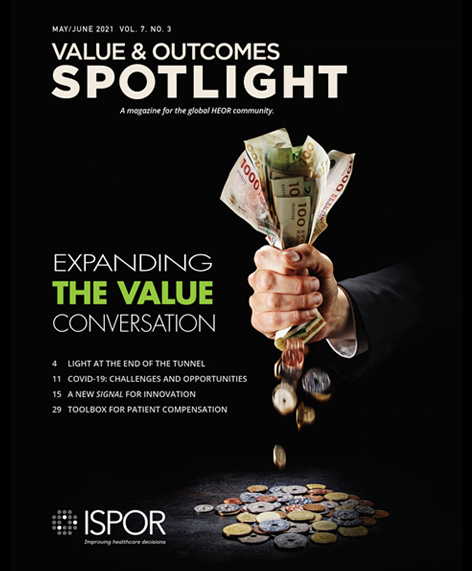Relevance of the ISPOR Competencies Framework in HEOR Fellowships in the United States
Soham Shukla, PharmD, MS, Center for Health Outcomes, Policy, and Economics, Rutgers University, Piscataway, NJ, USA; Zeba M. Khan, RPh, PhD, Ernest Mario School of Pharmacy, Rutgers University, Piscataway, NJ, USA; Laura T. Pizzi, PharmD, MPH, Health Outcomes, Policy, and Economics Program, Rutgers University, Piscataway, NJ, USA
ISPOR—The Professional Society for Health Economics and Outcomes Research—has established a set of competencies for health economics and outcomes research (HEOR) professionals. The 41 competencies are organized into 13 topic domains that collectively comprise the ISPOR Health Economics and Outcomes Research Competencies Framework™.1
Framing Out the Study
The ISPOR Competencies Framework has great potential to define and support the HEOR discipline. It can have numerous applications, including providing a “roadmap” to prospective candidates applying for HEOR jobs, aligning competencies to specific specialty job tracks within HEOR, and strengthening job postings on sites such as the ISPOR Career Center. This is the first effort to assess the practical application of the ISPOR Competencies Framework.
The objective of this study was to assess the relevance and applications of the ISPOR Competencies Framework to post-doctoral fellows seeking a career in the pharmaceutical industry. This was accomplished by asking representative professionals how they were exposed to the competencies within the framework of doing a postdoctoral fellowship in HEOR.
An HEOR Fellow Workgroup, unaffiliated with a professional organization, was established in 2017 to provide a network for PharmD postdoctoral students completing their fellowship in the Northeast region of the United States. Since then, the group has expanded in several ways and now includes more than 100 active members and alumni. Most members have PharmD degrees, but some may have an MPH or PhD in an HEOR-related field and can be in a program from any region in the United States. A short survey of 8 questions was emailed to members and alumni of the HEOR Fellow Workgroup.
Survey Results
The following demographic data describe the areas of heterogeneity within the sample and show how the Framework can be applied to different subsets of the HEOR workforce, postdoctoral fellows being one type:

The top 10 competencies in order of relevance were as follows:
1. Teamwork, Team Dynamics, and Relationships
2. Retrospective Claims Database Studies
3. Prospective and Retrospective Observations Studies (Real-World Evidence)
4. Presentation Development and Delivery
5. Epidemiology, Including Pharmacoepidemiology Studies
6. Health Economic Modeling
7. Systematic Literature Reviews
8. Burden of Illness Analysis
9. Orientation Towards Solutions and Success
10. Statistics and Analytics
The survey included 2 questions about the usefulness of the ISPOR Competencies Framework:
• “Would HEOR competencies help guide the future fellowship experience?”
• “If competencies from the ISPOR Competencies Framework™ were described in HEOR job descriptions, would it help in your future job search process?”
Some response excerpts are included in the Figure to give insight on how programs can use the results of this survey and the ISPOR Competencies Framework.
Figure. Excerpts of survey responses.

Building on the Foundation
This research marks the first application of the ISPOR Competencies Framework. The findings will be limited to a specific population of fellowship programs in the United States based on the respondents and certain missing competencies such as outcomes research and patient-reported outcomes, but it demonstrates the power and need for a defined set of competencies in the HEOR profession. The results may vary for international fellows, and it would be worthwhile to expand the sample in a future analysis to include HEOR postdoctoral fellows completing their fellowship outside of the United States.
The top 10 competencies in the overall group included a mix of methodologic competencies and “soft skills,” reflective of new professionals who typically place equal importance on building technical and professional development skills.
The authors believe fellowship programs conducted in the United States may find the results useful in improving the way fellowships are conducted in the future, and build upon existing HEOR fellowship guidelines.2 This study demonstrates that the ISPOR Competencies Framework is extremely applicable to HEOR fellowships, a postgraduate career opportunity that is increasing in popularity to develop the future leaders of the profession.
Additional analyses were also completed and were presented at the Virtual ISPOR 2021 conference. For information, please contact Soham Shukla.
References:
1. Pizzi L, Onukwugha E, Corey R, et al. Competencies for professionals in health economics and outcomes research: The ISPOR Health Economics and Outcomes Research Competencies Framework. Value Health. 2020;23(9):1120-1127. doi: 10.1016/j.jval.2020.04.1834.
2. Kane-Gill S, Reddy P, Gupta SR, et al. Guidelines for pharmacoeconomic and outcomes research fellowship training programs: Joint guidelines from the American College of Clinical Pharmacy and the International Society of Pharmacoeconomics and Outcomes Research. Pharmacotherapy. 2008;28(12):1552. doi: 10.1592/phco.28.12. 1552.
Explore Related HEOR by Topic

